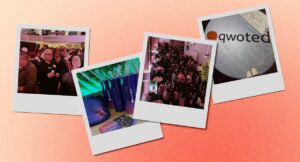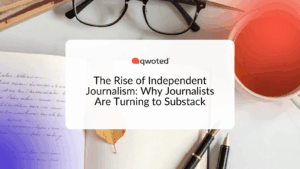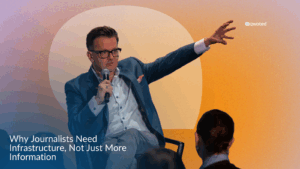What does journalism hurt for at this moment? Everyone has an answer, not that anyone stops to pose in turn an equally pertinent question: What does journalism do extraordinarily well? The question often suggests the answer; in a court of law that’s called “leading the witness.” We all know this even if we don’t stop as reporters, editors and thought leaders to appreciate it. When know-it-all frenemies ask me why so much news is fake, for example, I consider what they do for a living—let’s say accounting—and ask, “Hmmmm, why are so many bean counters corrupt?”
So … some questions simply aren’t worth our time, consideration or attention. But returning to my opening parry—“What does journalism hurt for at this moment?”—I contend a) the question is extraordinarily relevant, and b) I have an answer I actually think pretty much everyone can agree on. That’s right: Whether you work at Fox, the New York Times, Vice, a community paper … pretty much anywhere but those dens of the Naked (Naked News) and the Brain Dead (InfoWars).
Young journalists need mentors.
The case for this is so obvious, I don’t think it needs a PowerPointless presentation. We can all agree on this, correct? But I do think that with the busy-ness of the news business, the never-ending clarion call of deadline, the tectonic shifts of technology, many of us could benefit from a quick primer on why mentors are in short supply and proper mentorship is so hard to find.
1. News operations are decentralized
COVID-19 has only accelerated a trend that’s been growing for years now: Newsrooms are going the way of the dodo. Oh no. Yes, Zoom and the like have allowed us to continue working. It’s a nifty tool. But so is a steak knife, and I don’t want to replace my cereal spoon with a steak knife.
Much in the same way countless students are going numb in video classrooms, virtual meetings between writers and editors are stilted, lifeless, awkward affairs. Through them work gets done, but not the work of editors and writing coaches taking promising (or even not-so-promising, but hard-working) reporters under their wings. And to be fair, that’s not Zoom’s fault, though I’ll take every chance to bash on Zoom that I can get. (Like: You dial into your own meeting, the one you are hosting, and Zoom tells you, “The host has another meeting in progress.” Arrrraggghhr. Where’s my steak knife?)
I can recall perhaps half a dozen regular writing gigs where I never met my editor, talking to them once—and then, not hearing their voice again for years. Fortunately, I was already well into my career and had been coached/mentored/guided by a number of incredible journalists. But those coming up through the ranks right now aren’t nearly so fortunate. For all the smarts, energy and creativity they possess, they’ll be lucky if they can get strong guidance from a college professor or some semi-retired éminence grise at a small town paper who once strode the halls of the Times.
2. Online learning isn’t mentoring
My son is an aspiring writer and at 18, he can do things I couldn’t even comprehend until my mid-20s. Like so many of his generation, he’s been raised on Coursera, Khan Academy and the availability of massive open online courses (MOOCs for short). He’s learned a hell of a lot. Much of it he taught himself. He even does backline copy edits for me when I’m feeling especially stressed. But unless Dad mentors him—highly unlikely because like all dads of teenagers, I know next to nothing—then where will he dial that in? Chris is a freshman at DePaul University. He’d love to meet his like-minded classmates. He can’t. He’d love to talk up a professor over coffee. He can’t. He’d love to hang out in a newsroom. He can’t. Even Dad can’t make that happen right now.
So what do Chris and his peers do? They hunker down online, and look for third-rate substitute mentoring through talking heads that fill their brains with knowledge, but can’t fill they hearts with anything. Mentoring is a matter of the heart. “Zoom classes quickly lead to burnout,” Chris tells me. “There’s a lack of presence with the teacher.”
3. Institutional memory is disappearing
Every time a news outlet loses a senior journalist to buyouts, layoffs or forced retirements, a valuable resource walks out the door. Short-sighted CFOs (OK, I’ll stop picking on finance types) often judge a senior journalist’s value by numerical metrics: bylines produced, salary earned, readership generated, key performance indicators. By the way, I despise acronyms like “KPI.” So cold, so impersonal, so “man-as-machine” sounding. Take your Key Performance Indicator and shove it up your Analytics Superiority Stance.
What is too often missed—and a deeper, more astute financial analysis would bear this out—is how much an experienced, passionate, awe-inspiring journalistic leader can plow back good earth into a garden of young hopefuls. Many leaders in our midst, though, don’t usually get recognized unless they’ve “earned” some C-suite anointment or masthead title that they think legitimizes their right to pontificate.
So it gets tricky. Sometimes the mentors wind up in a sort of exile, like Yoda in a Star Wars swamp. Other times, the growing journalist has to double down on finding the mentor, investigative reporting of a different kind. That’s a hell of a thing when newsroom mentorship, just a generation or two back, was either a given or intentionally created.
The road ahead: What we can do
While I hold myself up as an example of very little except how to eat too much pizza, I will say this: I’ve been intentional about mentoring for most of my journalism career. My first mentee found me when I was 29, when the notion of mentoring anyone sounded as smart as trusting me with your firstborn. But she was so eager, so energized, that this 21 year old showed me how to love something I didn’t even think to check out. That she looked up to me like some kinda rock star didn’t hurt, either.
Besides, I only thought to do it because three years previous, the guy in the photo above had done the turn for me. I didn’t think I was all that good at the journalism thing until a superstar of the Philadelphia Inquirer’s South Jersey bureau took time from his mountain of deadlines to advise and encourage me. David Lee Preston, now recently retired, may not think he did all that much for me back in the day. You’d have to ask him.
But if you ask me, David was there. He saw the value in what I was doing and reflected it back to me. I read everything he wrote and used it as a self-styled field manual; he could be drop-dead serious or wickedly funny at the turn of a verb. His mother Halina Wind survived 14 months in the sewers of Lvov, Poland as she hid from the Nazis. Deep waters ran through him. And that he, one of the cool kids, even gave me the time of day made me feel extraordinarily special. Sometimes that’s all a mentor needs to do, though David did much more.
I don’t know how many burgeoning reporters, photographers, editors, investigative types or critics I’ve tried to guide since my first in 1993. The ones who wound up outshining me, and landed as leaders at The New York Times, The Guardian, the Milwaukee Journal-Sentinel, the University of Chicago’s Booth School of Business—so many incredible places!—may think I helped them. And it may be true. But they helped me a whole lot more, because something in me is wired to celebrate a hopeful who blossoms before my eyes. It’s kind of like being an out-of-the-limelight acting coach for someone like Tom Hanks. I never get tired of it.
When Qwoted completes the formation of its Media Advisory Board, we will take a good look at how we can be more intentional about doing for mentors what mentors have done for their charges. Cultivation is key. So many of the universities and colleges we’ve met with since I came on board already do an outstanding job. But when the students leave school and move into the field, who will be there to take the baton?
Maybe you, the person reading this.
Lou Carlozo is Qwoted’s Editor In Chief. All opinions expressed and thought leader poses are strictly his own. lou@qwoted.com


